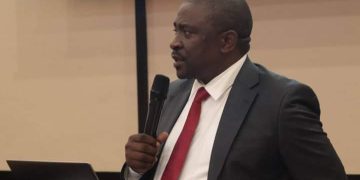The recently updated curriculum has garnered attention due to its purported impact on the academic performance of pupils since its introduction in 2013 at the primary level.
Referred to as the Integrated Curriculum, this new educational framework underwent piloting in select schools before its nationwide implementation. Concurrent with its adoption, there was a reduction in the number of secondary education levels from five to four by 2021.
This shift has prompted discussions and assessments regarding its influence on educational outcomes and pupil’s achievement within the nation.
Ntsibolane Letsatsi, Secretary of the Lesotho Teachers Association, underscored the learner-centric nature of the curriculum in an interview with the Weekly Observer, emphasizing the active engagement of pupils in the learning process.
Prior to the implementation of the curriculum, both teachers and unions consistently advised the Ministry of Education and Training regarding the necessity of maintaining a teacher-pupil ratio of 1:25. This ratio stipulates that one teacher should ideally instruct no more than 25 students, ensuring optimal learning conditions.
However, this assertion stands in contrast to the prevailing reality following the implementation of the curriculum. It is noted that a significant number of high schools accommodate up to 50 pupils per classroom.
Moreover, Letsatsi contends that certain subjects, notably within the domains of languages and sciences, are deemed obsolete, antiquated and fail to equip students with the requisite skills for sustenance post high school.
During an interview with the Secretary, several concerns were raised, notably regarding the comprehension of critical aspects of the curriculum and instructional methodologies among teachers.
It was observed that a significant number of teachers struggle to effectively convey essential information to students. Consequently, this knowledge gap, coupled with challenges such as overcrowded classrooms and the inclusion of redundant topics, has been identified as contributing factors to the subpar academic performance of Grade 11 pupils.
“Information is simply being shoved to the learner without teachers properly understanding what they are teaching,” he said and expressed that schools do not proper and adequate teaching and learning material.
Letsatsi further claimed that instead of providing learning and teaching aid for teachers and students, the Government removed Grade 7 and subjected teachers to teach concepts designated for Grade 9 to Grade 6 pupils, showing that the level of difficulty of said concepts impair pupil’s cognitive development.
He highlighted the proposition put forth by unions regarding the implementation of remedial teaching to mitigate the knowledge gap observed among primary pupils before transitioning to secondary education. The essence of remedial teaching lies in the reiteration and reinforcement of fundamental skills previously imparted, aimed at enhancing student performance in their ongoing or forthcoming academic endeavours. However, despite the earnest recommendation, the MoET did not accord due seriousness to this counsel, persisting in the practice of advancing academically unprepared learners to the subsequent grade levels.
The Secretary revealed that Grade 11 Lesotho General Certificate of Secondary Education (LGCSE) 2023 results confirm their fears that Secondary exit grade performances will be poor citing that, “These children start classes at 7am and end at 4pm, we pile a lot on them in a limited time frame and some of the things we teach them, they don’t even need.”
That, coupled with the limited number of teachers along with advancing academically unprepared learners led to the observed LGCSE results.
Countering poor governance, administration and neglect allegations, MoET Principal Secretary (PS) Rats’iu Majara asserted that he finds nothing wrong with the curriculum and claimed challenges relating to poor performance can be attributed to unqualified math and science teachers in some schools, unconducive learning environments, limited and inadequate facilities.
“We cannot say the curriculum is not effective, yes there are challenges and some other factors which can lead to the student’s bad performance, many factors come into play with regards to performance, teaching methods, teaching and learning materials can also lead to compromised academic performances,” he said.
The PS begged to differ with nothing that pupils are being taught redundant concepts and illustrated that adequate time is allocated to subjects for efficient teaching and learning outcomes, “I don’t think we are giving them too much information,” he supported.
He demonstrated that the guidance derived from technocrats, individuals with technical training and occupations who perceive many important societal problems as being solvable with the applied use of technology and related applications, served as the catalyst for the elimination of certain grades, as the material typically covered in grades 10 and 11 could feasibly be condensed into a single academic year.
However, he underscored that the Ministry is actively engaged in efforts to reintroduce those grades in 2025, which were previously removed.
Majara affirmed the Ministry’s recognition that overlooking potential issues at early grade levels can have lasting repercussions, necessitating a focus on strengthening Early Childhood Care and Development initiatives at the primary level.
National Curriculum Development Centre Director, Molapo Sekhotseng, elucidated the rationale behind the reduction of Primary and Secondary grades. This decision was motivated by the imperative to align educational objectives with the overarching goals outlined in the National Strategic Development Plan II, aimed at meeting the evolving needs of the nation.
Consequently, the Ministry of Education and Training (MoET) established a comprehensive Education Sector Plan, envisaging the reduction of Secondary schooling to four years. At the culmination of Grade 11, students will have the option to voluntarily pursue an Advanced Secondary Qualification (ASQ), thus offering flexibility and opportunities for further academic advancement.
According to the Director, educational institutions that undertook the pilot implementation of the ASQ encountered financial difficulties. The ASQ, being of foreign origin and possessing a distinct curriculum not aligned with the educational needs of Lesotho, was subsequently discontinued.
Consequently, Grade 11 students found themselves compelled to pursue additional academic endeavours to fulfil entry requirements for degree programs offered by both local and international higher education institutions. This necessity arose because their LGCSE qualification only provided access to certificate and diploma programs, rendering an upgrade imperative for progression to degree-level studies.
“The intention was that at the end of Grade 11, pupils would do ASQ, the Ministry then saw that the qualification was expensive and its curriculum alone did not address the needs of our country, the expectation was that, should pupils want to pursue and qualify for direct entry into any Degree program in Africa, they would first need to go through ASQ,” she said.
Sekhotseng further mentioned that after observing challenges with ASQ, the Ministry reviewed Curriculum and Assessment Policy 2009 and proposed that Secondary education should not end at Grade 11 but Grade 12 instead and taught a local curriculum.
“The plan is that at the end of 2025, pupils who want to pursue science and mathematics as a career after Grade 12, they should have what we call Lesotho Advanced Secondary Certificate on top of their LGCSE,” she said.
The Director has conveyed that, in accordance with the recently revised Curriculum and Assessment Policy, there will be a comprehensive review of the Secondary school curriculum. This review process will involve collaboration with teachers and unions, providing them with an opportunity to present concepts and topics they perceive as redundant or outdated. The aim is to ensure that students are not overwhelmed with information and that the curriculum remains relevant and effective.
“I personally would not remove anything from the curriculum, when we set the curriculum, we benchmark with current trends and global needs and give pupils a wide scope of knowledge in preparation for specialisation in further learning,” she continued.
She further explained that the purpose of Basic Education is not is not to specialise but to prepare learners and pupils for the world of work but prepares them for further learning in universities and colleges, “How will these pupils further their learning if we limit them to only a handful of concerts that we deem fit for day-to-day life in Lesotho and not the rest of the world?”






